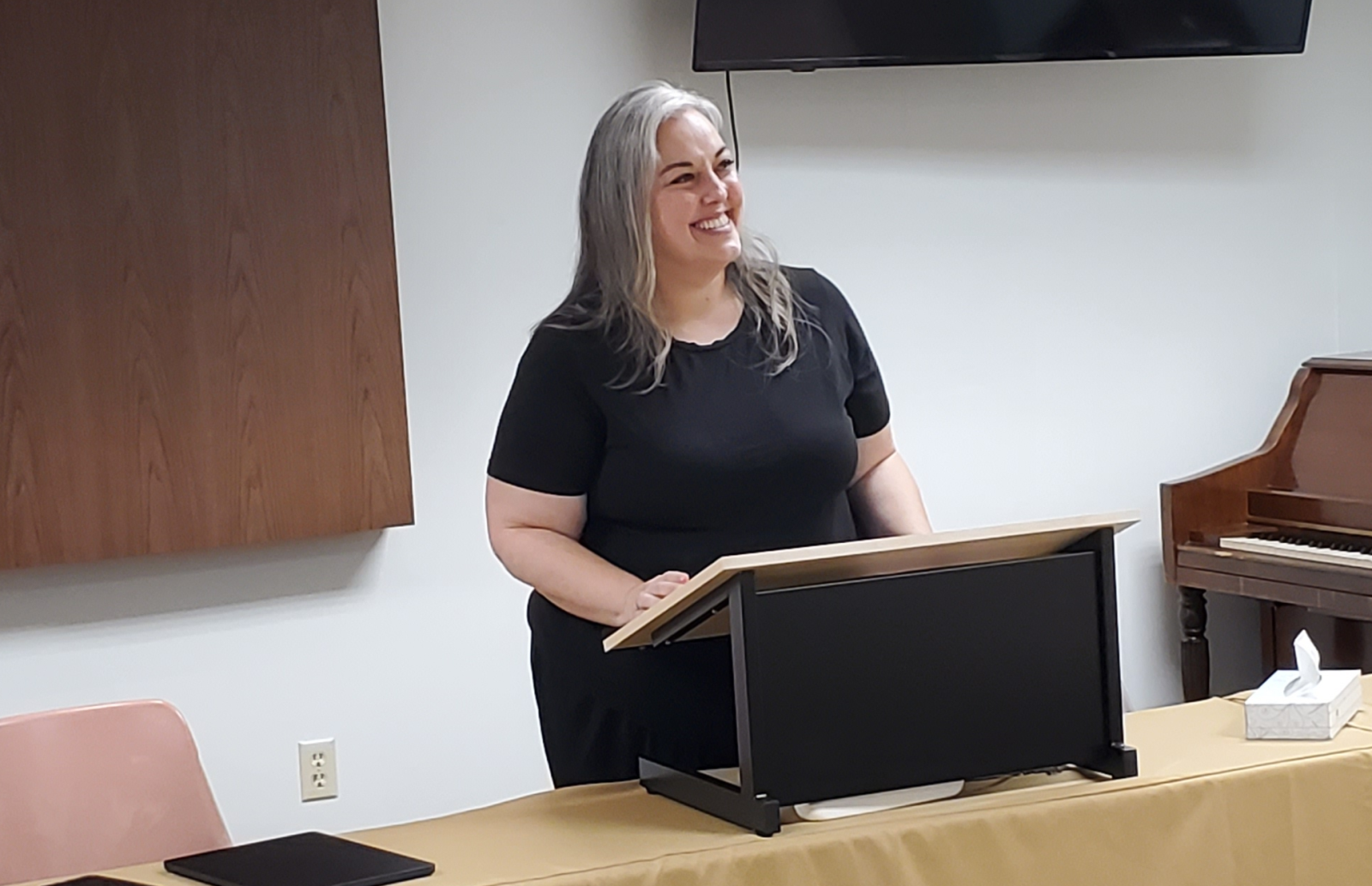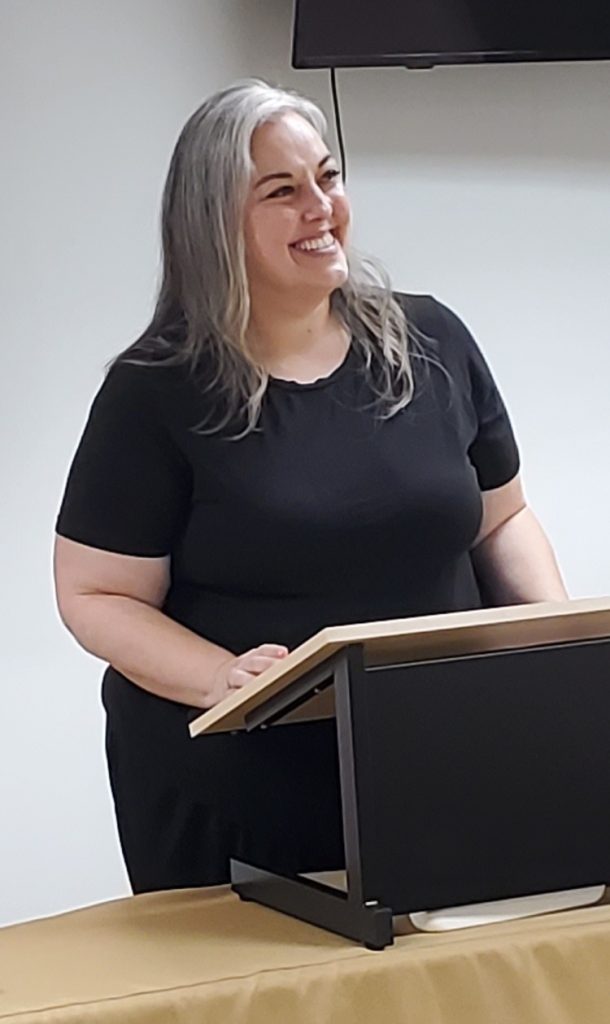
At the recent Paideia conference at Antiochian Village, I was blessed to hear Caitlin Gilbert present a paper on embracing the Orthodox intellectual life as a form of asceticism.
Gilbert, who is the Vice President for Schools and a Professor of Great Texts at Saint Constantine College and School in Houston, TX, spoke about her early struggles to integrate the intellectual life with her faith. Growing up in an intellectually impoverished evangelical culture, she became disillusioned with a church that could not answer her very natural teenage theological questions. Then she discovered the Christian intellectual tradition through works such as St. Gregory of Nyssa, Thomas Aquinas, Anselm of Canterbury, St. Augustine, and others. This, she explained, was “like a cooling and refreshing Spring that drew me towards the God I so wanted to know. This kind of intellectual engagement with the great theologians really became the core source of my spiritual formation throughout high school and college.”
This intellectual journey eventually led Gilbert into Eastern Orthodoxy as the fullest expression of the tradition she had grown to love. But then she was in for a shock as she encountered an Orthodox subculture that not only didn’t share her love for the Great Tradition, but looked on it askance. Gilbert explained:
Imagine my surprise and concern when I began experiencing a phenomenon within my beautifully pious Orthodox students and perhaps even more dramatically in the comments of fellow parishioners or even clergy at my local parishes. I found that many did not view Orthodoxy as this expansive whole that encompassed the intellectual and spiritual traditions of the Church, but rather as a Church that stands in opposition to a Western world that has become overly intellectual, materialistic, and divorced from spiritual reality. I found that many of my most faithful students or the most enthusiastic parishioners were afraid of the Western intellectual tradition, and skeptical of their own ability to think about their faith without falling into pride and error. The specter of “scholasticism” ever haunts us, as we worry that thinking about God might lead us astray.
Here I could really relate to Gilbert since I experienced something similar coming into Orthodoxy. I share the story of my conversion in my book, Rediscovering the Goodness of Creation, and, as the title of the book suggests, my conversion to Orthodoxy was a move into a more expansive vista of all that is good, true, and beautiful – not less but more. So when I became a victim of militant anti-intellectualism and anti-westernism, this made me very depressed and confused. Does being Orthodox mean I have to hate C.S. Lewis and the music of J.S. Bach because they are “western”? It’s hard to forget how people in my parish, and even children, began policing me for reading Protestant theologians like N.T. Wright and John Walton, and pressuring me instead to drink at the anti-intellectual wells of polemicists like Fr. Peter Heers and Fr. John Romanides, with their neo-Epicureanism that distances God from the rationality of this world and, in the process, colludes with the two-tiered epistemology of the deism. (Sad fact: nearly all my original friend group who took this anti-intellectual stand have now left Orthodoxy, some lapsing back into Calvinism in the search for a more intellectually robust faith, and others going into schismatic groups in the quest for an even greater cognitive insularity.)
Back to Caitlin Gilbert. She told us that through her work running an Orthodox classical school, she’s been surprised to find that those in the community who register the greatest caution about the education offered are not Protestants but Orthodox. Her paper, “Praying and Thinking about Beauty: On Spiritual Contemplation and the Philosophical Act,” attempted to redress this drift, showing that a robust Orthodox intellectual life can be—and historically has been—embraced as a form of asceticism, as a spiritual discipline.
“We can properly understand academic discipline and activity,” she said, “as a kind of ascetic activity that has the ability to increase our attention, our ability to look inward, and prepares the mind and heart for the reception of Christ and his kingdom.” From there she proceeded to put St. Gregory of Nazianzus and St. Gregory Palamas in dialogue with Josef Pieper and Simone Weil, in a synthesis that was so beautiful I exclaimed during the Q&A that I felt like jumping up and down for joy.
Gilbert had a section in her paper where, drawing on Gregory Nazianzus, she showed that intellectual activity is valuable even in the absence of clear answers to our questions, because the process has value regardless of the outcomes, and even when the outcome involves probable failure to understand.
We acknowledge that proper intellectual activity is attempting to “pierce the dome,” to examine the self, to understand and contemplate the good, and therefore is inherently beyond us. And yet, it is, it seems, our work to do. Because what choice do we have? Because we can’t comprehend God fully must we give up trying to know him? Or become afraid of our own attempts to know because we might be bad at it? Of course not. In fact, St. Gregory Nazianzus points out that we actually are really stupid about almost everything, and don’t know all sorts of things, but that doesn’t stop us from thinking about, pursuing, and getting better at understanding them all the same. If failure to understand was a true justification for lack of belief or persisting in lack of understanding, then we should say we don’t believe in our own nature, or why the stars shine the way they do or that time exists, because we don’t actually fully understand any of it. But that is silly. We don’t
understand because we are small and the world is vast and beautiful and big and God is even more so. And that is all good and right. So Glory to God, let’s keep exploring.
That observation was very meaningful to me in the context of the Paideia conference. In dialogue with philosophers at the conference, I was hoping to get many of my questions answered – not that I exactly came with a list, but whenever I’m around people who have thought deeply about the deep questions, it’s hard to escape the impulse to think, “Maybe now I’ll find answers to the metaphysical and theological questions I’ve been wrestling with.” Hearing these words was like a nudge from the Holy Spirit letting me know that the act of questioning and intellectual exploration is valuable for its own sake, though not the highest good. (On how finite things or activities can be intrinsically good without being the highest good, listen to Dr. Phillip Cary’s remarks in the podcast we did for Ancient Faith Today.)
A double joy is that Gilbert not only vindicated the Orthodox intellectual life, but situated it within the virtues of attentiveness and patience – two virtues that tend to be undermined by the factory-nature of so much, so called, “classical education.” I couldn’t help but wonder whether, had American Orthodoxy more fully embraced its intellectual roots decades ago, if we might now be in a position to more effectively speak into the current crisis in classical education. Headmasters, teachers, and parents are finally recognizing that perverse incentives have sedimented themselves into our schools at the institutional level, leading to graduates that are high in the intellectual vices like argumentativeness, quick thinking, and grandiosity, but low on the intellectual virtues like humility and attentiveness. But most of the current discourse merely circles the problem without pointing the way towards solutions. I’m convinced that solutions won’t be forthcoming until we rediscover the centrality of the intellectual virtues. But how many classical headmasters, board members, and administrators, give even half the attention to cognitive virtues as they do to content? Perhaps Eastern Orthodoxy is in a position to lead the way in this dialogue by reframing education around the cognitive virtues, including the centrality of asceticism in the intellectual life.
I’ll close with a section from Gilbert’s paper where she explores how our anthropological tradition might translate into a slower and more humane pedagogy. From her paper:
A truly Orthodox understanding of the human person would require us to allow our students the time and space to really study so as to grow in wisdom, patience, humility, and understanding, and to grow in their capacity to attend and their ability to examine themselves, for these things are the very form of the prayer that the Fathers so desire for us. An Orthodox school, therefore, should give its students things worth attending to, things that are beyond them, and plenty of time and space to do the work of the mind, in humility, so that we train the soul to attend to God, who is greater, more vast, and more incomprehensible than any idea that the intellect can present.
Christian tradition here is united in an understanding of contemplation and philosophical work that is much more like prayers of humility than anything else. We recognize our limitations, we look to ourself and examine our own hearts properly, and then we think about the world, God, and the universe. And then we do it all over again. Forever. In Oration 27, Gregory exhorts us, “Speculate about the Universe—or universes, about matter, the soul, about natures (good or evil) endowed with reason, about the Resurrection, the judgement, reward and Punishment, or about the Sufferings of Christ. In these questions to hit the mark is not useless, to miss it is not dangerous. But of God himself, the knowledge we shall have in this life will be little, though soon after it will perhaps be more perfect in the same Jesus Christ our Lord, to whom be glory, for ever and ever, Amen.”



